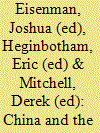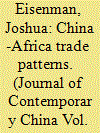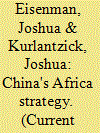| Srl | Item |
| 1 |
ID:
080073


|
|
|
|
|
| Publication |
Armonk, M E Sharpe, 2007.
|
| Description |
xxiii, 232p.
|
| Standard Number |
9780765617132
|
|
|
|
|
|
|
|
|
|
|
|
Copies: C:1/I:0,R:0,Q:0
Circulation
| Accession# | Call# | Current Location | Status | Policy | Location |
| 052953 | 327.5101724/EIS 052953 | Main | On Shelf | General | |
|
|
|
|
| 2 |
ID:
167484


|
|
|
|
|
| Summary/Abstract |
This study examines the role elite factional politics played in China’s decision to attack Vietnam in February 1979. Whereas existing studies have clarified the geopolitical context and the influence of China’s international relations with other states, this one unlocks the connections between the war, China’s post-Mao political succession struggle, and a long-standing dispute between the supporters of two distinct military doctrines—Mao’s People’s War strategy and, its rival, military modernization. To establish whether causation exists, this study first identifies the causal mechanism, then conducts a careful investigation of the relationship between the decision to go to war and the power struggle that raged in Beijing at the time. Process tracing is used to conceptualize and sequence six distinct stages in the causal chain between 1959 and 1981; that is, in the lead up to, during, and in the aftermath of the war. The primary conclusion is that, in addition to international considerations, Deng Xiaoping advocated the attack on Vietnam because it allowed him to accelerate military modernization and de-Maoification and thus defeat his political rival Communist Party Chairman Hua Guofeng and take control of China.
|
|
|
|
|
|
|
|
|
|
|
|
|
|
|
|
| 3 |
ID:
114227


|
|
|
|
|
| Publication |
2012.
|
| Summary/Abstract |
China's trade patterns with African countries have made Beijing the focal point of new anti-Chinese resistance narratives in Africa. Unlike the Maoist era, when China's trade policies served its leaders' political goals, now they aim to access markets as part of China's larger domestic development strategy. China's state-run firms can channel China-Africa trade through extra-market decisions that influence flows, yet, ultimately, Beijing's ability to direct trade with Africa is constrained by market forces. Despite suggestions that shared illiberalism drives China-Africa trade the author concludes that five interrelated causal factors overwhelmingly determine China-Africa trade: China's comparative advantage in labor-intensive and capital-intensive production; Africa's abundant natural resource endowments; China's rapid economic growth; China's emphasis on infrastructure building at home and in Africa; and the emergence of economies of scale in China's shipping and light manufacturing sectors.
|
|
|
|
|
|
|
|
|
|
|
|
|
|
|
|
| 4 |
ID:
069412


|
|
|